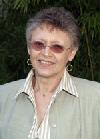

Inducted in 2006
Francoise Barre-Sinoussi, co-discoverer of the virus responsible for AIDS, is dedicated as a scientist and human being to fighting the disease. She runs an important research unit, which works on the impact of the innate defenses of the host in controlling HIV/AIDS. Throughout her career, she has been guided by the values of Louis Pasteur. She has relied on her principles and research, public health, and teaching.
Francoise has received many endorsements and awards for her professional achievements in the public health and teaching arenas, including two honorary degrees from two upstanding institutions; the University of New South Wales in 2014 and Tulane University in 2009. In the course of her career, Francoise has sought to share her knowledge. She has participated in over 250 international conferences and has trained many young researchers.
Francoise has actively contributed to several scientific societies and for committees at the Institut Pasteur and for other AIDS organizations, like the National Agency for AIDS Research in France. She has also been honored at an international level, notably as a consultant to the World Health Organization and UNAIDS-HIV.
In 2012, she became the president of the International AIDS Society, and that same year, she also became a grand officer of the National Order of the legion of honor. Francoise additionally works as the president of the regulation of the retroviral infections division at the Institut Pasteur and has co-authored over 240 scientific publications on HIV/AIDS.
In 2008, she received the Nobel Prize in Physiology or Medicine. Some of her other numerous awards include: the Sovac Prize, the Körber European Science Prize, the Prize of the French Academy of Sciences, the King Faisal International Prize, and the International AIDS Society Prize.
Francoise opened her laboratory at the Pasteur Institute in 1988 to do further research on HIV after discovering it in 1983. The crucial discovery quickly made available to the world the invaluable diagnostic tests needed to control this disease. Francoise has initiated since the 80s collaborations with developing countries where she has managed networks with multidisciplinary dedication.
She works on establishing permanent links between basic research and clinical research with the aim of achieving concrete improvements in the areas of prevention, clinical care, and treatment. With this aim in mind, Francoise joined the Institut Pasteur in Paris in the early 70s. Her research quickly turned to a particular group of viruses—the retroviruses, knowledge that helped her make the incredible discoveries of her later career.
Nobel Prize
Wikipedia
Britannica